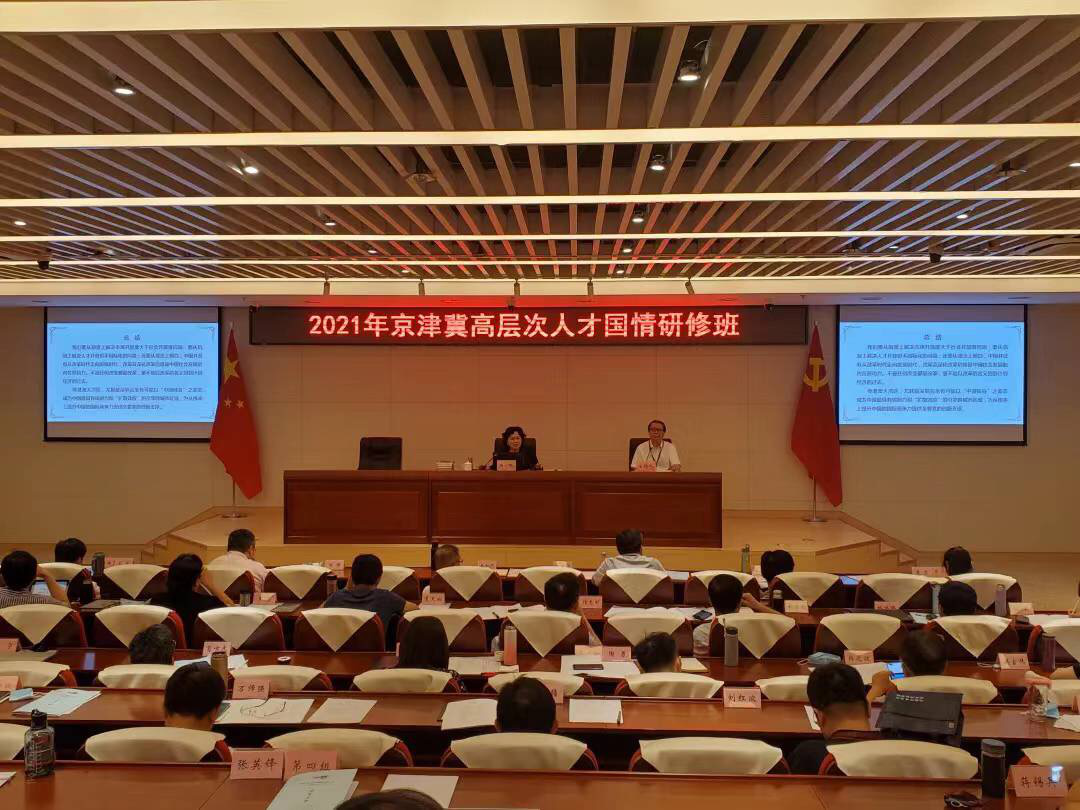On the morning of July 7, 2021, Prof. Tao Yitao, director of China Center for Special Economic Zone Research (CCSEZR), Shenzhen University (SZU) and president of the Belt and Road Research Institute (Shenzhen) for International Cooperation and Development (BRRIICD), shared the development experience of Guangdong-Hong Kong-Macau Greater Bay Area (GBA) in the Seminar on National Conditions Study for High-Caliber Talent in Beijing-Tianjin-Hebei (BJ-TJ-HB) Area by invitation of the Talent Bureau of the Organization Department of Beijing Municipal Committee of Communist Party of China (CPC).
To implement President Xi Jinping’s talent strategy, promote flow of talent across regions, and achieve BJ-TJ-HB regional integration, Prof. Tao introduced the GBA development experience in the seminar and dived into three topics:
1) comparison of the formation mechanism of bay areas at home and broad, and corresponding theoretical analysis;
2) institutional innovation mission of the GBA outlined in the 14th Five-Year Plan;
3) the unique role of Shenzhen Special Economic Area (SEA) in the GBA development.
Prof. Tao believed that the GBA will simultaneously undertake three missions.
· Reinforcing China’s strategic scientific and technological strengths
The GBA will be an icon of the innovation-driven China, a strong growth pole that will impact surrounding regions, an open and outward-looking area where top-class resources for boosting national technological strength are pooled together, and the “China’s brain” to building China into a science and technology superpower.
· Sharing prosperity with Hong Kong and Macau
The GBA needs to remove institutional and cultural barriers between mainland China and Hong Kong and Macau, build communication channels to facilitate reaching consensus, establish a mutual trust mechanism, and provide equal opportunities so as to maintain long-term prosperity and stability of these two cities.
· Promoting coordinated regional development and addressing regional inequality to speed up the shift towards modernization in all fronts
The GBA will give impetus to neighboring regions through “diffusing effect”, promote cost-effective, efficient and free flow of factors by building a larger cross-regional market, and create a “neighborhood effect” to prevent “polarization effect”. The GBA will be a “source of release”, being large in size and power, in coordinated regional development.
Prof. Tao emphasized that “We need to institutionally address the problem of market openness being greater than social openness, and the problem of international talent shortage despite of our open policy on talent; we must be aware that China is still in a stage of reform instead of development, and reform and deepening reform will still be an internal driving force of Chinese social development. Furthermore, not all changes can be called “reform”. We shall not go back to the planned economy era in the name of reform.” She concluded that “As an institutional deployment for deepening reform and a new economic growth pole for larger regions, the Greater Bay Area will pilot various reform measures to continue to provide sharable, replicable experience and development models to facilitate China’s effort in deepening reform, exploring new foreign trade patterns and becoming an innovation-driven country. The GBA will also provide a China solution for the emerging economies and developing countries looking for a path to development and prosperity.”
Prof. Tao’s lecture won high praise from the students, and gave them valuable inspirations and inputs for promoting coordinated development of Beijing, Tianjin and Hebei.

On the afternoon of the same day, a delegation led by Prof. Tao and Mr. Gao Xingmin, Deputy Director of CCSEZR attended the workshop “Soft Power of Cities in the Digital Economy Era” hosted by Beijing Yizhuang International Talent Development Group Co., Ltd. in Beijing Economic-Technological Development Area. Around 100 experts from different walks of life including biomedical, eco-environment protection, public healthcare, science and technology venture capital, intellectual rights, and digital industries shared information and industrial dynamics in the workshop. They also discussed about how to improve global resource allocation capabilities, build a new international communication and cooperation pattern in the digital economy era, and develop the human-centric soft power of cities. This workshop was recorded by CCTV and followed up by Yangshipin App.
